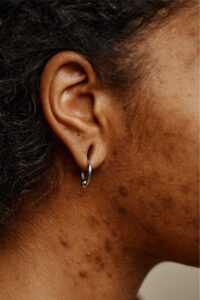Are you troubled by stubborn dark spots on your face, particularly in the cheek, forehead, and upper lip areas, sometimes referred to as the “melasma mustache?”
If so, you might be dealing with a common skin condition called melasma. In this blog post, we will explore the etiology of melasma, its biological underpinnings, its prevalence, and de-stigmatizing this condition.
We will also delve into different treatments for melasma and the importance of seeking a qualified dermatologist experienced in melasma and similar skin conditions.
Etiology of Melasma
Melasma is a perplexing skin disorder, but its primary causes are not entirely understood. Several factors are believed to contribute to its development, including hormonal changes, UV radiation, genetics, and the use of certain cosmetic products.
These factors can stimulate melanocytes, the pigment-producing cells in the skin, leading to melanin overproduction.
Biological Underpinnings
Melasma occurs when there is an overproduction of melanin in the epidermal layers of the skin. The melanocytes are the key culprits in this process, particularly in the upper lip area, leading to the appearance of a “melasma mustache.” When stimulated by factors like hormones and UV radiation, these cells produce excess melanin, causing the formation of dark patches on the skin. Understanding this biological process is essential in developing effective treatment strategies.
Who is Prone to Melasma?
Melasma doesn’t discriminate and affects individuals of all skin types and colors. However, it is more commonly seen in those with Fitzpatrick skin types III-V, which includes individuals with light to medium brown skin tones. Women are also more likely to develop melasma, with 90% of cases occurring in females.
De-stigmatizing Melasma
Melasma can have a significant impact on an individual’s self-esteem and quality of life. It’s important to de-stigmatize this condition and recognize that it’s a common skin issue that affects countless people. You’re not alone in your struggle, and there are effective treatments available to help you regain confidence in your skin.
Different Treatments for Melasma
If you’re wondering how to get rid of melasma, there are several treatment options available. Here are some popular approaches:
- Topical Creams: Dermatologists often prescribe topical treatments containing ingredients like hydroquinone, retinoids, and corticosteroids. These can help lighten dark spots, even out skin tone, and address that stubborn “melasma mustache.”
- Chemical Peels: Chemical peels use acid solutions to exfoliate the top layers of the skin, reducing the appearance of melasma.
- Laser Therapy: Certain laser and light-based treatments can target pigmented areas and break down excess melanin.
- Sun Protection: The most important aspect of melasma treatment is preventing its worsening. Always use broad-spectrum sunscreen with an SPF of at least 30 and wear protective clothing when outdoors. Remember to reapply sunscreen every two hours. Check out our blog post on the best practices for sun protection.

Importance of a Qualified Dermatologist
Seeking a skilled dermatologist with experience in treating melasma and similar skin conditions is crucial. Oftentimes, melasma can be misdiagnosed, so a knowledgeable provider is key! A knowledgeable specialist can assess your unique situation, recommend the most suitable treatment plan, and monitor your progress.
While it may be difficult, it’s important to remember that you’re not alone in your struggle. By seeking the guidance of a qualified dermatologist and adhering to proper sun protection, you can manage and even reduce the appearance of melasma, helping you regain confidence in your skin’s appearance.
Don’t let dark spots on your face get you down; take the first step towards healthier, more radiant skin today. Contact us at Scar Healing Institute to get your journey started.
Schedule an Appointment
Scar Healing Institute
Scar Healing Institute is committed to developing the most effective treatments for scarring. Our team of scar revision specialists are continually inventing the latest technologies and formulas to deliver the best results for our patients.




